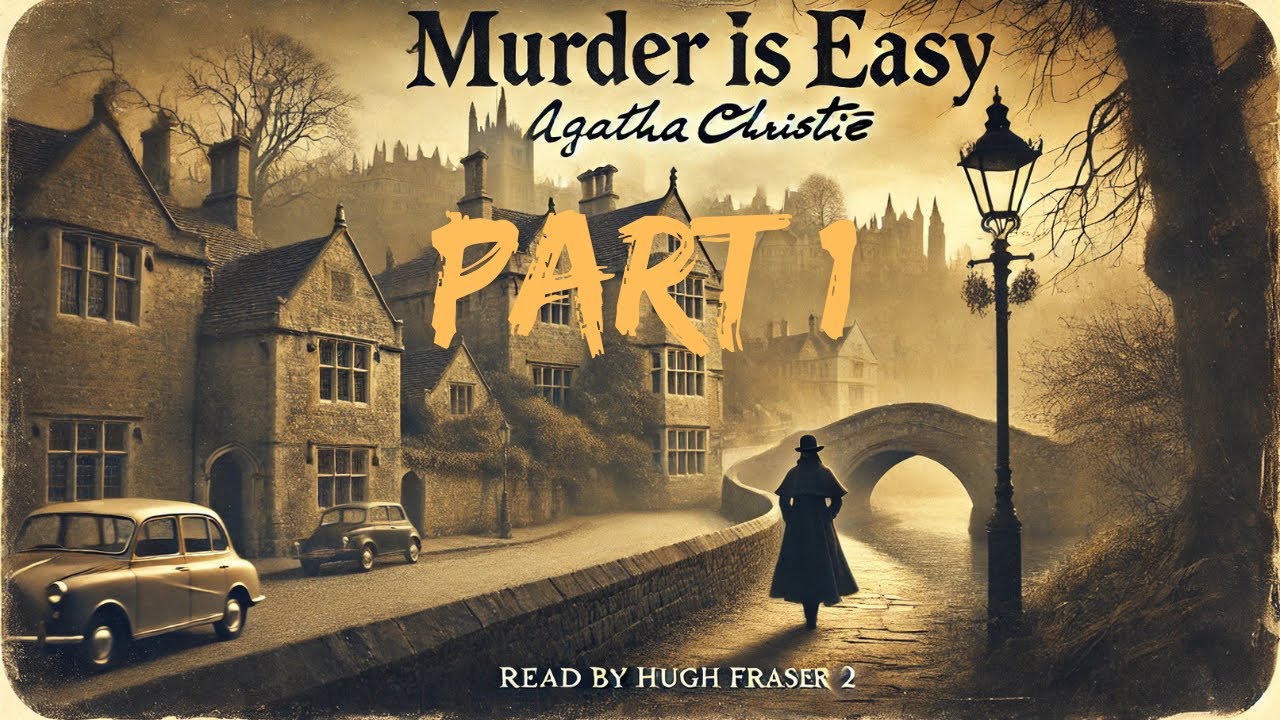When we think of murder, we often get lost in a swirling storm of morality, psychology, and cultural narratives. Yet, in certain circles, the phrase “murder is easy” might ring truer than we’d like to admit. This chilling notion doesn’t just appear in dark underbelly stories or true crime documentaries; it permeates pop culture, social discussions, and even our subconscious. Dive in with us as we explore the layers of this grim assertion, analyzing its twisted logic through vivid pop culture examples, psychological perspectives, and cultural reflections.

7 Examples of “Murder Is Easy” in Pop Culture
1. Ruthless Ambition in American Psycho
The character of Patrick Bateman, masterfully played by Christian Bale, encapsulates the eerie detachment with which society can brush over moral boundaries. Bateman’s chilling monologues provide a glimpse into the psyche of a man who sees murder as a matter of convenience. The film drives home the unsettling truth that, in a world fixated on status and power, the act of killing becomes a mere extension of one’s ambition.
2. The Psychological Drama of Gone Girl
Imagine framing your husband for your murder—sounds crazy, right? Yet, in Gillian Flynn’s electrifying narrative, Amy Dunne achieves just that. The meticulous planning and cold manipulation embedded in her actions highlight a darker facet of human nature where murder is effectively reduced to an act of revenge. Through betrayal, bitterness, and calculated deception, Flynn crafts a chilling tale where the line between love and lethal intent is terrifyingly thin.
3. The Obvious Culprit in Murder, She Wrote
Jessica Fletcher, the beloved amateur sleuth from Murder, She Wrote, beautifully dispels any illusions surrounding the complexities of murder. Each episode unravels mysteries within seemingly ordinary communities, showing how the chaos of daily life can conceal deeply rooted motives. Fletcher’s seemingly effortless deductions reveal how murder can, alarmingly, appear routine amid life’s distractions, turning the act into a predictable affair.
4. Media Sensationalism and Its Influence
The tragic case of the Menendez Brothers serves as a haunting reminder of how media can shape our understanding of murder. The brothers claimed their actions resulted from a traumatic upbringing, stirring public debate and sometimes leading people to feel sympathy. The sensationalized coverage generated a dialogue around morality, indicating how societal constructs can influence opinions on murder, even positing that it’s understandable under certain circumstances.
5. The Casual Betrayal in Fatal Attraction
What starts as a casual affair in Fatal Attraction spirals into obsession and horror, showcasing how even simple decisions can escalate into catastrophic outcomes. Alex Forrest’s transformation from a lover into a murderer serves as a gripping reminder of the personal relationships that can thunder down the dark path of betrayal. This haunting narrative asks us to examine our choices—what seems harmless may lead to unimaginable consequences.
6. The “Screw My Wife” Mindset in Real-Life Cases
Murder motivated by infidelity isn’t just a trope in film. High-profile cases like that of Scott Peterson illustrate how personal betrayals can lead individuals to rationalize violence. As tempting as it is to dismiss it as fiction, these cases reflect a harsh reality where “screw my wife” translates into deadly decisions, reiterating the twisted notion that murder is a feasible alternative to emotional conflict.
7. The Notion of “Hard to Kill” in Contemporary Crime
The phrase “hard to kill” often justifies actions that fall far outside moral societies consider acceptable. In the controversial true crime documentary “Making a Murderer,” viewers witness the raw socio-economic factors that blur the line of morality. When survival or self-defense enters the equation, the act of murder is seen through a lens that someone could argue makes it more palatable.

Psychological Underpinnings: Why Do People Believe Murder Is Easy?
Psychology suggests that extreme emotional states and perceived threats can cloud moral judgment. In stressful scenarios, individuals may easily rationalize violent behavior as justified, particularly when influenced by media narratives, societal expectations, or overwhelming grief. The motives explored in the Screw My Wife discussions carry intense weight, with betrayal quickly churning sentiments into justifications for desperate actions.
Moreover, desensitization—thanks in part to our constant exposure to violent imagery across various media—fuels misconceptions that murder is an uncomplicated option. Characters like Alex Forrest highlight how emotional turmoil translated into violence frequently leads to devastating outcomes. The disconnection we feel from screen portrayals often lulls us into believing that the unthinkable is reachable.

Examining “My Fault” and Its Multiple Layers
The phrase “my fault” carries rich emotional baggage when applied to characters in film. It serves as a reminder of the complexities surrounding guilt and responsibility depicted in movies like My Fault 2. The characters grappling with the ramifications of murder often sidestep culpability, an all too intriguing reflection of real-life dilemmas.
By engaging with these narratives, audiences gain a glimpse into how collective fears, blame, and moral decline shape human behavior. It’s a dance of denial and acceptance—an exploration that compels the viewer to contend with the question of personal accountability.

A Cultural Reflection: “Touch My Wife”
Cultural narratives surrounding infidelity can stir our deepest instincts and notions of betrayal, revealing the darkness that lurks within human relationships. The theme manifests in both films and actual cases where infidelity catalyzes devastating consequences. The bitter struggle between love, jealousy, and morality invites viewers to reflect on the volatile nature of desire.
The exploration of betrayal forces us to confront uncomfortable truths; love can quickly morph into vengeance in the most dangerous of ways. But what does that say about us as a society?

Understanding the Balancing Act of Morality
In life’s intricate tapestry, the idea that “murder is easy” masks the emotional and psychological labyrinths that lie beneath. Each character study, whether on-screen or in the headlines, illustrates how fragile moral reasoning can become under pressure. The impact of societal influences and personal strife difficultly balances common sense and profound empathy.
Ultimately, as we ponder over the themes of betrayal, morality, and the dance between affection and violence, we confront a haunting reality: murder is rarely straightforward. The lingering question remains— is it really as easy as it seems, or do those who commit such acts simply reflect a deeper turmoil that simmers beneath the surface? This exploration of the eerie psychology encourages us to reflect not only on our stories but also on the very nature of existence amid the chaos we create and embrace.
By thoughtfully engaging with these narratives, both from cinema and reality, we’re left pondering our own roles within the dance of life, love, and the darkness that sometimes emerges.
Murder Is Easy: A Gripping Look at Its Twisted Logic
Fun Facts About the Mystery Genre
When diving into the riveting narrative of “Murder Is Easy,” it’s hard not to notice how the genre has inspired so many iconic figures. For instance, did you know that the talented Broderick Crawford, who brought many intense roles to life, once starred in a classic mystery film? His knack for embodying suspenseful characters complements the chilling premise of murder at its most deceptive. Just like that, the intricacies of crimes and how they unfold on screen keep audiences glued to their seats.
Speaking of crime, we can’t ignore some real-life scenarios that echo the book’s spine-chilling theme. For instance, Nichol Kessingers involvement in a notorious case highlighted how perception can twist the narrative. Just like characters in literature, real-world figures often leave us pondering their motives and moral dilemmas. What might have seemed simple becomes a tangled web when you consider the consequences of murder. And let’s not forget about our favorite villain archetypes, which often create a strong connection to characters like Cassie from Euphoria, who plays with the fine line between right and wrong.
The Twists and Turns of Storytelling
“Murder Is Easy” takes the classic whodunit to a whole new level, expertly revealing how even the simplest plot can have surprising turns. The book delves into the psychology behind crime—why would someone choose that path? One could argue it’s a bit like figuring out a seating arrangement in a stadium, where everyone’s position can change the game entirely. Take the Kyle Field seating chart, for example; understanding one’s place can shift perceptions and even alliances.
Moreover, writing in this genre can also lead to fascinating career paths. Many authors—even those who started with Robinhood Careers—often seamlessly transition into creating captivating stories steeped in intrigue. It’s a testimony to how diverse experiences can enrich storytelling. The creativity involved in weaving such tales often reflects the processes we go through in life, like when adapting to new challenges just as the art style shifts in series like Witch Hat atelier.
Reflecting on Morality in Fiction
As we consider the moral implications of “Murder Is Easy,” it’s just as important to reflect on why these themes resonate. The human psyche experiences a tug-of-war when confronted with extreme actions. So, when someone says, I hate Myself in a moment of realization, it’s similar to how characters grapple with their choices throughout the narrative. What a great reminder that tough topics like these highlight our humanity, making such stories relatable while disturbing.
At the core, “Murder Is Easy” isn’t just about the act itself; it’s a thrilling exploration of the heart and mind. With so many intriguing angles, it shines a light, much like Paula Zwagermans remarkable ability to dive deep into character motivations. So, the next time you get lost in a mystery, remember that the twisted logic behind murder isn’t just a story; it illustrates the complexity of human existence.

















